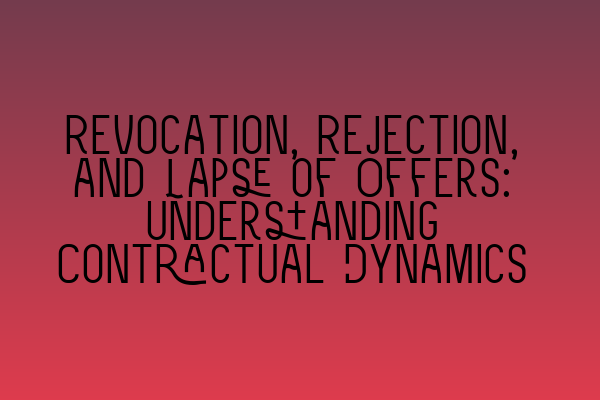Revocation, Rejection, and Lapse of Offers: Understanding Contractual Dynamics
Welcome to SQE Contract Law! As a solicitor, writer, and SEO expert, I am here to provide you with valuable insights into various legal topics. In today’s blog post, we will delve into the intricacies of revocation, rejection, and lapse of offers in contract law. Understanding these dynamics is crucial for both legal professionals and individuals involved in contract negotiations. So, let’s get started!
Before we dive into the details, let me provide you with some related articles that you may find interesting:
– Mentorship for Aspiring Solicitors: Nurturing Talent in the Legal Field
– Exploring Alternative Dispute Resolution: An Effective Approach to Legal Conflicts
– The Art of Contract Drafting and Negotiation: Skills Every Solicitor Should Master
– Navigating the Legal Practice Course (LPC): Your Path to Solicitor Qualification
– Mastering Client Care Skills: Essential for Solicitors
Now, let’s focus on revocation. Under contract law, an offer can be revoked by the offeree at any time before it is accepted. This means that the person making the offer (the offeror) can change their mind and withdraw the offer. However, it’s important to note that the revocation must be communicated to the offeree. Simply having a change of heart without informing the other party does not constitute a valid revocation.
To ensure a successful revocation, it’s advisable for the offeror to communicate the revocation in writing or through a reliable method that can be proven later if needed. This not only protects the offeror but also ensures transparency and clarity in the contractual relationship.
On the other hand, rejection is the offeree’s response to an offer, indicating that they do not wish to accept the terms proposed. Rejection terminates the offer and leaves both parties free to pursue other options. It’s crucial for the offeree to clearly communicate their rejection to the offeror, preferably in writing, to avoid misunderstandings or future disputes.
Now, let’s turn our attention to the lapse of offers. Offers can lapse due to various reasons, such as the expiry of a specific time period mentioned in the offer, the occurrence of a specific event stated as a condition, or the death of either party involved. Lapse due to the expiry of a specified time period is common in contract negotiations where time is of the essence. It’s important for both parties to be aware of the time limitations and act accordingly to avoid any potential issues.
Additionally, an offer can lapse if the offeree fails to accept the offer within a reasonable time frame. The concept of ‘reasonable time’ may vary depending on the circumstances, such as the nature of the contract, industry standards, or the urgency of the matter at hand.
Understanding the dynamics of revocation, rejection, and lapse of offers is crucial for anyone involved in contractual negotiations. Whether you are a solicitor, a business owner, or an individual entering into a contract, being aware of these principles will help you navigate the complex world of contract law with confidence.
As we conclude this blog post, I encourage you to explore our related articles for further insights into different aspects of contract law and the legal profession. Mentorship for aspiring solicitors, alternative dispute resolution, contract drafting and negotiation skills, the Legal Practice Course (LPC), and client care skills are just a few topics covered in these informative articles.
Thank you for joining us today at SQE Contract Law. If you have any questions or would like to discuss your specific legal needs, feel free to reach out to us. Remember, knowledge is power, and understanding these contractual dynamics will undoubtedly contribute to your success in the legal arena.
Disclaimer: This blog post is for informational purposes only and should not be considered legal advice. Please consult a qualified solicitor for your specific legal needs.
